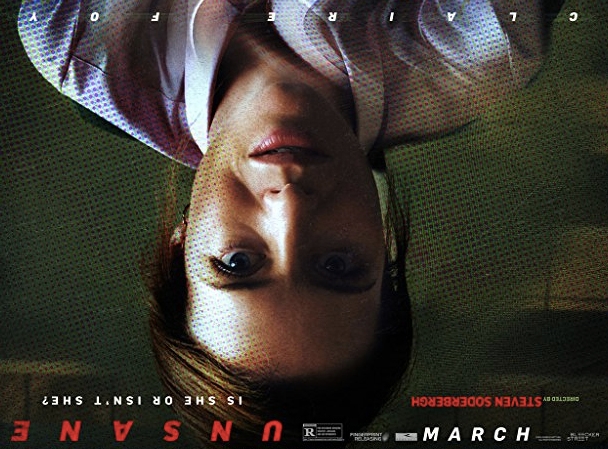Steven Soderbergh commits himself to the crazy premise (and cheap iPhone imagery) of Unsane

Taking the pulse of American anxiety for the nth time, director Steven Soderbergh concocts an unusually literal vehicle for his principles of deception, clinical detachment, and self-imposed constraint (not to mention his interest in the deceptive language of therapy) in Unsane, an art-brut not-quite-thriller about a financial analyst (The Crown’s Claire Foy) who gets tricked into committing herself to a sketchy mental hospital where her stalker has taken a job under an assumed name. Shooting on an iPhone 7 Plus (in a non-standard 1.56 aspect ratio, to boot) under harsh lighting that flatters neither the cast nor the filmmaking capabilities of the iPhone, Soderbergh adopts the characteristic delirium of cheaptastic schlock, a film’s one-sided conversation with production values that aren’t there. But his subversion of the genre’s usual showiness and self-help themes—the law of protagonists as acquiescent victims who only need to learn to confront their fears, self-actualize, or read Dianetics for evil to vanish in a puff of smoke—doesn’t include an exit strategy or a form of suspense. Most of the thrills here come from watching one of our canniest directors perform rattling wheelchair dollies on a waxed hospital floor while over-punctuating video-noisy close-ups and cheesy music cues.
Drawing parallels between profit-driven healthcare and gaslighting, Unsane sends Foy’s Sawyer Valentini to the half-empty Pennsylvania mental health facility called Highland Creek in search of a support group for victims of stalking; through a Kafkaesque rigamarole, she ends up unwittingly signing up for a 24-hour observational stay. Nate (Jay Pharoah), a sympathetic patient who’s three weeks into an opioid addiction program and seems to have mastered the ins and outs of Highland Creek, clues her in to their business model: bilking insurance (within legal limits, of course) to make up for a shortage of patients. Thus, the doctors are more than happy to commit Sawyer for a full week when she recognizes one of the orderlies as David Strine (Joshua Leonard), the man who stalked her when she was a college student, and reacts as any normal person would.
To the Highland Creek staff, Strine is “George Shaw,” a hardworking new hire with no record. Perhaps there’s some significance to the name, related to Strine’s fantasies of remaking Sawyer into the perfect woman only he can see hidden behind her brusque exterior and wavering Boston accent. But his delusion also smacks of those bromides about becoming a better you. Sawyer’s predicament is absurd: Her surest ticket out of Highland Creek involves pretending that nothing is wrong. Shrewdly sidestepping (and sometimes critiquing) the implicit victim-blaming and ignorance of root problems that lurk within so many movies about violence against women, James Greer and Jonathan Bernstein’s script juggles interesting ideas, though some end up lost in the piling bodies and ensuing ludicrousness.
Soderbergh’s filmmaking always mixes elements of minimalism and misdirection, an internal relationship that corresponds to his work ethic; after all, the only big-league director who shoots and edits his own films has a liking for pseudonyms. Even in the context of a filmography that’s long betrayed a self-identification with con artists (the Ocean’s movies, Side Effects, The Informant!, the recent Logan Lucky, etc.), the manipulations here seem pointed: In its best moments, Unsane is a film about the forced denial of trauma. But its intentional crudity—the muddy iPhone look with its voyeuristic connotations—and lack of typical Soderbergh-ian panache exposes plot holes and flaws in style. Focus is both a narrative and a technical issue throughout the film, and the further it moves away from dark comedy, the more it veers into outright silliness. Maybe, like a number of Soderbergh films before it, it’s also a statement on the economy and the movie business. The fact that it was made on the same budget as the director’s Sundance-defining debut, Sex, Lies, And Videotape, is proof that a buck doesn’t buy what it used to.